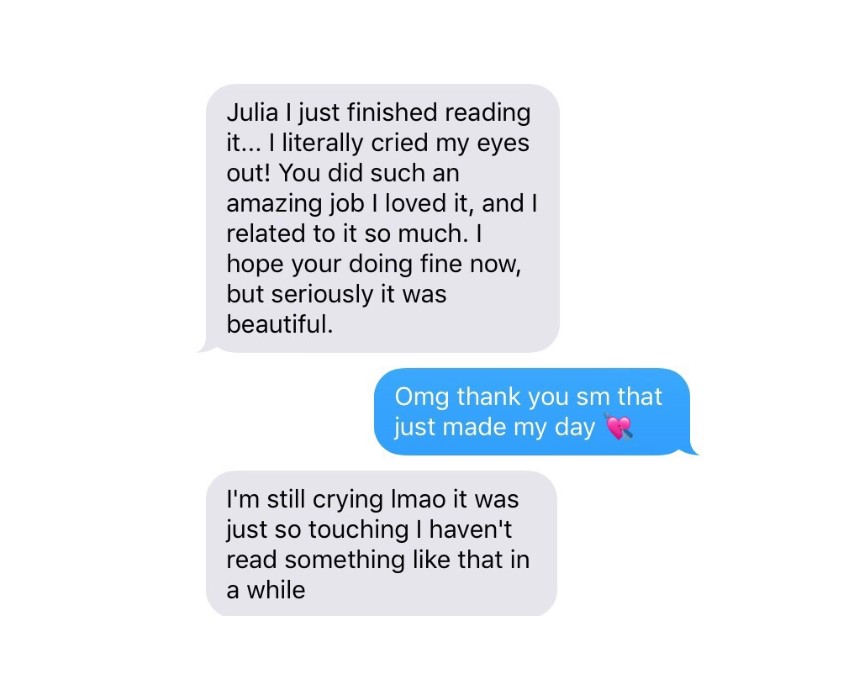I always wrote for myself. I had some things published in small, local literary magazines, but I always wondered where my writing would actually take me. What was the point of all of these metaphors and pretty language? I knew I wasn’t going to make a career out of my poems, but I did want to reap something more out of the skills I have grown. Over this past summer, that very thing took flight.
After an abusive relationship, mentally and physically, during second semester of last year, I was able to be free during my summer months. I happily drowned myself within the love of my family, beaches, reading, and of course–writing. I spent MONTHS editing a piece for The Odyssey. The Odyssey is a great, and simple way to get your thoughts published for all to see. But I wouldn’t know the effect that my words would have on people… it was absolutely life changing, and that is why I continue writing today. I wrote all of my feelings into one comprehensive piece about my relationship and how I felt during, and after, it. Putting all of those thoughts on paper, and compiled into one simple document literally took the thoughts out of my mind and my overthinking complexity, while diminishing my anxiety and overall, making me happy. It was my own therapy. But little did I know how many people I would help in the process, and who ultimately my piece would reach. I titled my piece “To The Girl With The Broken Heart”, because when I had my heart broken, I didn’t have that ‘big sister’ figure to give me wisdom and help me out. I wanted to be that person to the girl who needed it at any given moment–no matter who they were or where they lived. I wanted to get to her. Because I was once, her.
I published my piece, and I got SO much feedback, so quickly it was unreal. Girls who I didn’t even know, from Ohio, and Texas, personally messaged me telling me their stories and how they resulted in eating disorders and suicidal thoughts due to a boy, but my article aided them into believing more in who they were and how he should not have that power over her. My friends texted me the most encouraging things, and saying that they were tearing up from my words and that my piece meant so much. The texts, and messages, and overwhelming support blew my mind, and made me realize how much my words can help and affect people. Even just yesterday, my cousin called me and told me she recently re-read my article because she needed to. And my roommate has it bookmarked on her homepage so it’s at her disposal. When I returned to school in the fall, girls would come up to me at frat parties asking me if I was “the girl with the broken heart” and if I wrote the article. I told them yes, and one young lady literally started hugging me and crying, telling me how I helped her so much and she felt like she knew me. All of these compliments in person, shares on Facebook, and love and support, really encouraged my confidence in my writing, and in myself.
But, nothing will compare to when he read my piece. He read it, and told one of his friends, who then told me his ‘thoughts’ on it. He stated that it was far too ‘over the top’, and that it ‘doesn’t bother him’. But, my goal wasn’t for it to bother him. It wasn’t even for him–it was for me, and for the girl who needed it. But the fact that he read it proves A LOT. And that he claims to have brushed it off proves even more.
I often refer to women as ‘queens’. I think that is the ultimate word to describe people, and I especially use it for myself. Not in an arrogant or gloating way, but in a perfectly proud, and confident sense. I always wear a bracelet with a small crown on it, to remind myself that I know what I am worth. After my break up, that defined me in the best possible way. I knew what I deserved, and I became much more comfortable and confident after finding myself. So, I wear this bracelet as a reminder that I am important, and I am beautiful, and I am smart–and I know that. And I wish more people had this realization overall, that everyone is worth it. I wrote my Odyssey piece specifically for this purpose, and I will continue to write, with this end goal in mind, always.
https://www.theodysseyonline.com/girl-and-her-broken-heart

